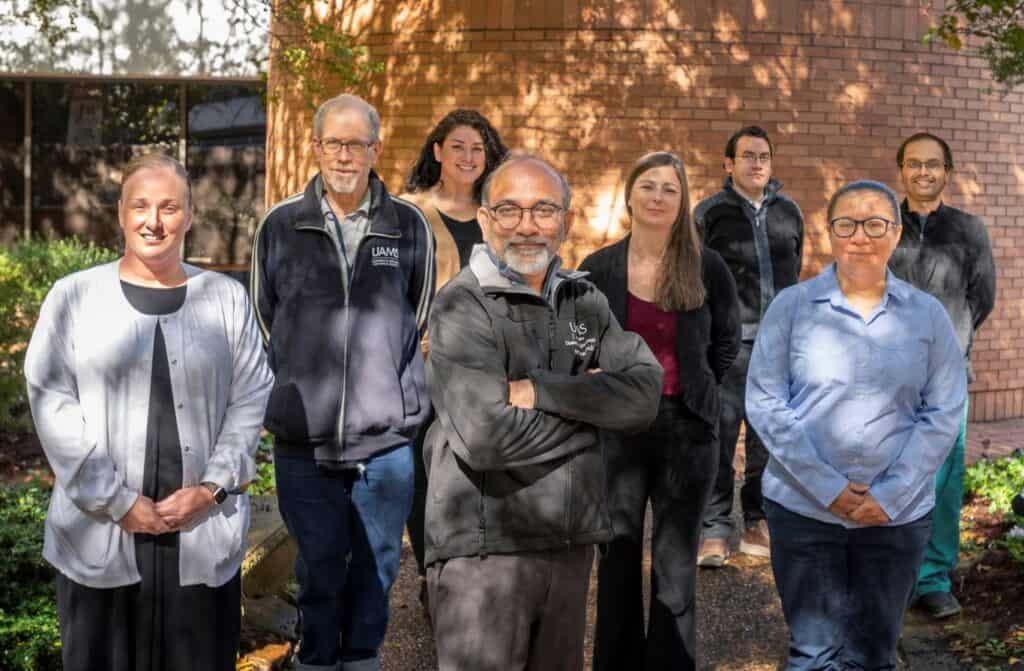By David Robinson
Researchers at the University of Arkansas for Medical Sciences (UAMS) hope to gain important insights about fetal neurodevelopment in a new study with diabetic pregnant mothers.
Funded by a four-year, $1.5 million grant from the National Institutes of Health (NIH), the first study of its kind will use advanced fetal monitoring techniques and blood tests of diabetic pregnant mothers. Researchers hope the study involving more than 300 women and their newborns will be a step toward finding new drugs or other helpful treatments.

Hari Eswaran, Ph.D., who is leading the study, said it would build on existing knowledge about the connection between diabetes in pregnancy and developmental problems for babies. The multidisciplinary team science project includes UAMS researchers at Arkansas Children’s Research Institute.
Infants and children from diabetic mothers are more likely to have neurological issues such as low IQ, poor muscle control and delayed language development, said Eswaran, a professor in the College of Medicine Department of Obstetrics and Gynecology and director of research at the UAMS Institute for Digital Health & Innovation. The prevalence of births complicated by type 1 or type 2 diabetes has increased by about 50% in recent years.
Eswaran will use a unique device he helped develop at UAMS known as Superconducting Quantum Interference Device (SQUID) Array for Reproductive Assessment (SARA). The noninvasive device can detect fetal brain activity through the mother’s abdomen.
SARA will be used in this study to check fetal responses to sound and visual (light) cues. That information will be compared with the mothers’ blood tests analyzed by the collaborating research team at Arkansas Children’s.
The lab-based part of the study is led by Shannon Rose, Ph.D., an assistant professor in the College of Medicine Department of Pediatrics, Division of Allergy and Immunology. Her team will measure a battery of inflammation markers associated with diabetes, including pro-inflammatory cytokines, such as interleukin-6 and C-reactive protein.
“This should provide much better insight into the specific mechanisms of inflammation that impact fetal development,” Rose said. “If, for example, we determine that interleukin-6 is really elevated and is associated with poor outcomes for babies, then that might be a target for a future drug clinical trial.”
“This is a classic bridge between clinical electrophysiology and laboratory science,” Eswaran said. “No other researchers have conducted a study that involved using functional brain analyses with this technology to correlate with maternal inflammatory biomarkers in diabetic pregnancies.”
Other members of the UAMS research team are:
- Debopam Samanta, M.D., co-investigator, associate professor, Division of Pediatric Neurology, Department of Pediatrics, College of Medicine
- Diana Escalona-Vargas, Ph.D., co-investigator, assistant professor, Division of Pediatric Neurology, Department of Pediatrics, College of Medicine
- Nafisa Dajani, M.D., co-investigator, professor, Department of Obstetrics and Gynecology, College of Medicine
- Ankita Shukla, M.D., co-investigator, Department of Pediatrics, Division of Neonatology, College of Medicine
- Stefanie Kennon-McGill, Ph.D., co-investigator, instructor, Department of Environmental & Occupational Health, Fay W. Boozman College of Public Health
- Eric Siegel, M.S, project manager, UAMS Department of Biostatistics
- Kanan Vyas – research assistant, Division of Allergy and Immunology, Department of Pediatrics, College of Medicine
- Heather Moody, RN, research nurse, Department of Obstetrics and Gynecology, College of Medicine
- Luis Mercado, Ph.D. post-doctoral fellow, Department of Obstetrics and Gynecology, College of Medicine
